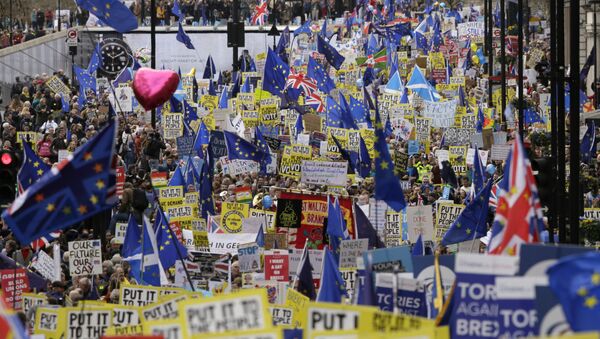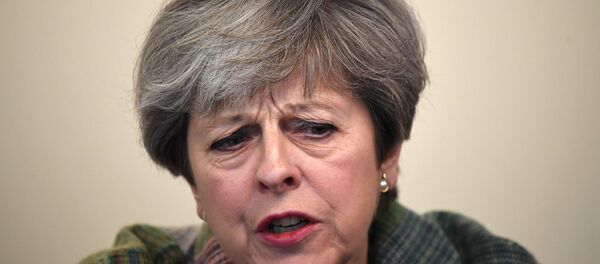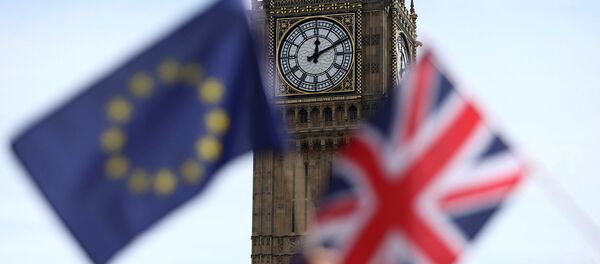This comes after the House of Commons rejected UK Prime Minister Theresa May's deal for a third time. The EU responded by calling for a summit on 10 April. The Sunday Times reported earlier that a number of ministers from Theresa May's cabinet may resign over differences regarding the country's withdrawal from the European Union as the country has reached a complete deadlock over Brexit.
At the same time, at least six anti-Brexit ministers have decided to resign if May endorses the idea of a disorderly no-deal Brexit, the paper added. Meanwhile, Theresa May and her Cabinet are looking for ways to bring her EU withdrawal agreement back to the Commons for a fourth attempt at winning the endorsement of the MPs, the BBC reported on Saturday. Mrs May said the UK would need "an alternative way forward" after her plan was defeated by 58 votes on Friday.
MPs from all of the parties will test support for other options during a second round of "indicative votes" on Monday.
READ MORE: UK Parliament Rejects All Brexit Options in 2nd Round of Indicative Votes
Radio Sputnik has discussed the latest developments around Brexit with Dr. Martin Farr, Senior Lecturer in Modern and Contemporary British History at Newcastle University.
Sputnik: Theresa May has said that she might ask Parliament to vote for a fourth time on her Brexit agreement. Do you think this is going to happen? And is there any chance that there would be a different result than we have seen before?
Dr. Martin Farr: It may happen and it may be that there is a different result. She would only even consider putting it there a fourth time if there was a good chance or any chance actually that it might pass and hope that she sufficiently convinced Brexit people on her side that not to pass this a fourth time would risk no Brexit altogether. Each time she has whittled down and reduced the size of the defeat. And one more heave I think is the philosophy that she maintains, mainly because she is not a particularly agile or imaginative politician and feels constrained to go along the route that she set out for herself last year. So, I expect that she will… but a lot depends on the vote that we have this afternoon.
Sputnik: And what are your thoughts for the results of that indicative vote? Because with the first time, there was nothing really decided by that vote, was there?
What the purpose of it was? It was to reduce the options to one or two of the most popular, or you might say, the least unpopular of the options. And that would include the Customs Union of Kenneth Clarke and the common market 2.0 of Nick Boles. So, the idea would be that today there may be sufficient support or there may be a majority for one of those options, but the complicating factor is that the government isn't obliged to follow any of the decisions. So, they are indicative votes only, they are not compelling or binding votes. So it may give momentum to one of the arguments for leaving or one of the plans for leaving but it doesn't compel or require the prime minister to adopt them.
Sputnik: Exactly right. And then there is still the problem of getting that passed [through] the EU even if that is approved by Parliament. What are your thoughts on that?
And a great deal depends on what the European Union in itself is prepared to do. As I am sure you have mentioned, there would be an emergency council meeting on 10 April to try and determine the way forward, because at the moment, we leave without a deal two days later. So I think that the lack of appreciation for the view from the continent has bedevilled consideration of this issue as far as public debates and the public at large is concerned. They kind of think of it as being a British decision, when in fact, it is a much more complicated process than that.
Sputnik: Exactly. Now, when somebody like Jean-Claude Juncker says that "we are running out of patience", does that in any way stimulate the MPs in the House of Commons to perhaps be more serious, to perhaps really try to find some kind of a compromise or a solution?
Dr. Martin Farr: I am not sure that Juncker saying that will have that effect. Certainly, Juncker saying that will have the effect of irritating many people in the country and of causing the mainly right-wing press, which is keen to leave on no-deal terms, the World Trade Organisation terms, to be even more nationalistic in its language and presenting this as the Europeans pushing Britain about, the kind of language that was a big part of the referendum campaign itself. Now, I think the politicians, the MPs, are quite clear that this is an extremely serious situation.
READ MORE: #BREXIT: 'Theresa May's Deal is Rotten to the Core' — Political Economist
But there is no majority for anything. One of the problems I think is managing public appreciation of what is going on. So much of what the public say in terms of when they are listened to, when they are interviewed or when they phone into programmes, the dissatisfaction they express, the irritation, the sense that the politicians are not doing what they asked, it doesn't really appreciate just how complicated this process was always going to be, and how much more complicated it is when there is no majority in Parliament, which of course, is a consequence of Theresa May losing her majority in the election of 2017.
So, you couldn't actually create or engineer a situation that was more likely to produce what we have now: the one that came about as a result, in the first place, of a fairly narrow decision in the referendum in 2016 and a Parliament with no majority in 2017. This type of confusion and a delay were inevitable from that point onwards.
What is your take on that movement? And, for instance, Tony Blair, the former Prime Minister, has said that the Tory MPs should fear those six million people. Are they a force to be reckoned with, and does that really reflect the feeling in the country right now?
Dr. Martin Farr: The broad answer to that question is that everything that has taken place since 2016 has tended to have the effect of, to use a modern term, doubled down, i.e. reinforced the views of people. The view they had before has been reinforced by this. So, whatever has happened, this is further stiffened the resolve of those who want to leave and those who want to stay, with very little in the way of changing attitudes. So, while one can say that six million people did sign the petition online, which is an extraordinary number of people, those that did not sign and wanted to leave could simply say: "17.4 million people voted in 2016". So many more people did vote in the referendum than have gone online for the petition.
The views and opinions expressed by the speaker do not necessarily reflect those of Sputnik.








